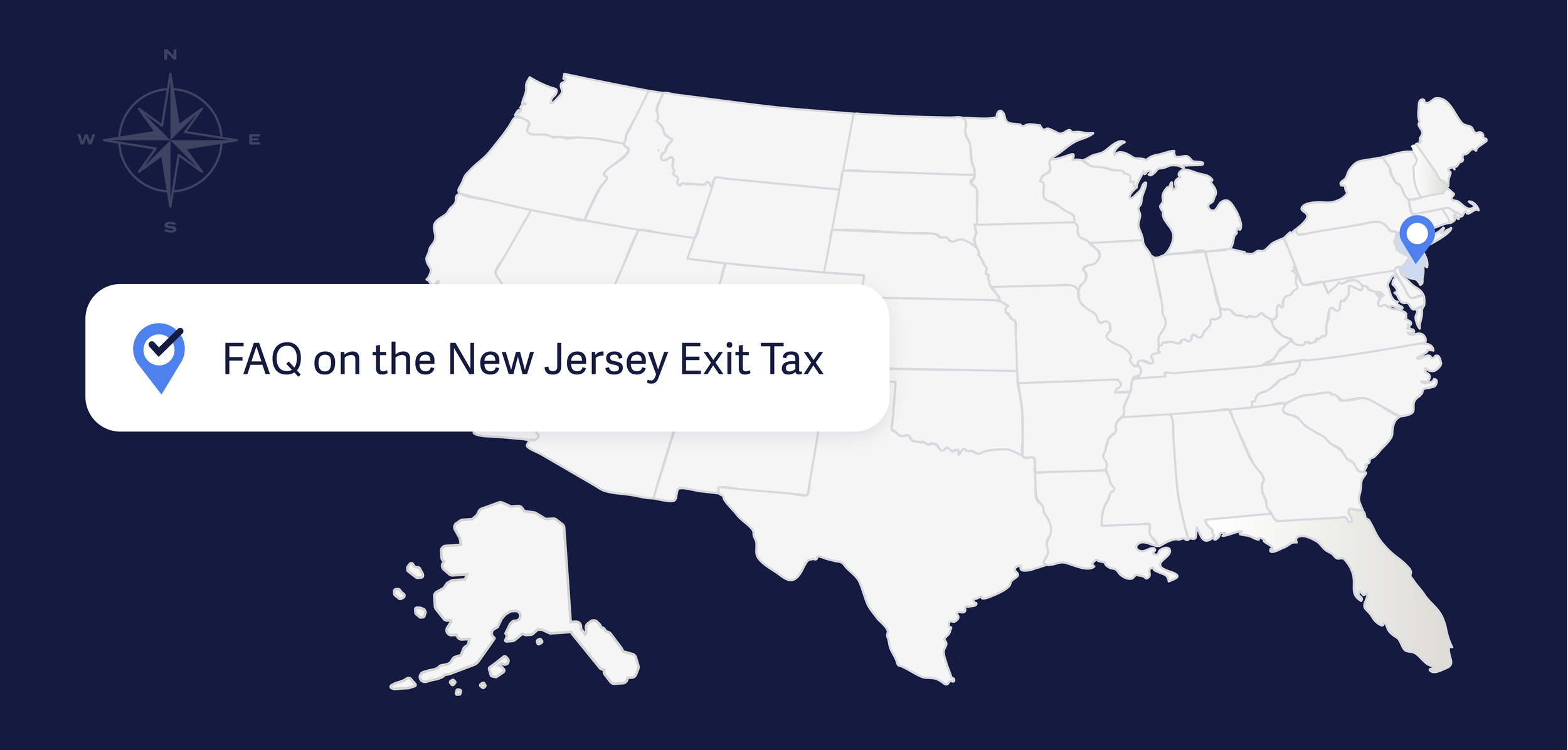Frequently Asked Questions About the New Jersey Exit Tax
If you’re considering selling your home in New Jersey and moving out of state, you should familiarize yourself with the NJ Exit Tax and potential cash flow implications.
To help simplify related details, this article offers answers to some common questions surrounding this very topic.
What is the NJ Exit Tax?
Many people assume the NJ Exit Tax is an additional tax or special tax imposed when you sell your property. The truth is, however, that the New Jersey exit tax is merely a prepayment of the estimated tax you’ll owe on the sale of your property: paid in advance (either before or at closing), held in escrow, and then settled when you file your state income tax return.
Why does the NJ Exit Tax exist?
Those who sell a home in New Jersey are required to pay taxes on any sales profits whether it’s a principal residence, second home, or investment property.
Prior to 2004, many people evaded this tax. For example, residents who moved out of New Jersey and homeowners who never actually resided in the state (e.g., rental property owners) would simply never settle their tax bill upon selling their homes. The New Jersey Exit Tax was therefore enacted in 2004 to address this same issue.
How is the NJ Exit Tax calculated?
The law states that New Jersey is to withhold either 8.97% of the profit/capital gain made on a home sale or 2% of the total sale price (whichever amount is higher).
To calculate your profit, you first need to know your home’s “adjusted basis”: meaning what you paid for the home plus the cost of any capital improvements (not repairs) you’ve made. For example, if you paid $350,000 for your home and spent another $50,000 upgrading your kitchen and bathrooms, your adjusted basis is $400,000.
Next, you’ll calculate the net proceeds (the sale price minus the cost of the sale) from your home sale. For example, assuming the sale price was $500,000 and the cost was $50,000, your net proceeds are $450,000. Sales costs include commissions, legal fees, realty transfer fees, and other expenses associated with selling a property.
In the aforementioned example, the profit is $50,000 (net proceeds of $450,000 minus the home’s adjusted basis of $400,000). The estimated tax is $10,000, therefore, as 2% of the sale price is higher than 8.97% of the profit.
How does the NJ Exit Tax work?
At closing, the settlement agency (or buyer’s attorney) must file a GIT/REP form to the State of New Jersey and hold the money—in our example, $10,000—in escrow. Keep in mind this law prohibits any county officer from recording a deed unless accompanied by this form and estimated tax payment.
When you file your New Jersey tax return later on, the amount you prepaid is then credited towards your final state income tax liability for the year in which the sale occurred. If a capital gain is realized on the sale, the amount is deducted from the estimated tax payment you made—with any remaining funds returned to you. In the event you sell the home at a loss or in the absence of a capital gain (and prepaid tax), you’d receive a full refund when you file your New Jersey state income tax.
Who is responsible for paying the NJ Exit Tax?
Sellers moving out of state need to pay the NJ Exit tax, meaning they have to prepay the estimated tax owed on the sale of their property. Exemptions exist, however. Before we get into them, let’s first define residency status since exemptions and closing requirements for the NJ exit tax are based on these distinctions.
While residents are defined as anyone who sells a home in New Jersey but maintains residency within the state, nonresidents are defined as those who sell a home in NJ but establish residency out of state. Part-year residents (those defined as either a resident or nonresident for only a portion of the year) are also considered nonresidents.
Residents
Those who remain a New Jersey resident must file a GIT/REP-3 form (due at closing), exempting them from paying estimated taxes on the sale of the home—with any applicable taxes on sales gains reported on their NJ gross income tax return instead. Furthermore, New Jersey residents who’ve occupied their primary residence for at least two of the last five years can exclude up to $250,000 of the gain (for single tax filers) and up to $500,000 of the gain (for those filing jointly).
Nonresidents
Nonresidents are required to make an estimated tax payment unless they qualify for an exemption (“Seller’s Assurances”), listed on the GIT/REP-3 form and reflecting the following criteria:
· The property sold was used as a principal residence and qualifies under IRC Section 121 of the Internal Revenue Code: excluding up to $500,000 in gains for married taxpayers or $250,000 for single taxpayers. To qualify for this gain exclusion, the home must have served as your primary residence for at least two of the last five years.
· Total consideration for the property is $1,000 or less.
· The deed is dated prior to August 1, 2004 and not previously recorded.
· The property sold is subject to a short sale instituted by the mortgagee, whereby the seller has agreed not to receive any proceeds from the sale and the mortgagee will receive all proceeds—paying off an agreed-upon mortgage amount.
Are seniors exempt from the NJ Exit Tax?
Unfortunately, age is irrelevant with respect to the New Jersey Exit Tax. No matter how old you are, you are required to follow the same rules as everyone else (outlined above).
In sum: the New Jersey Exit Tax
Hopefully, this post helped clear up any confusion surrounding the New Jersey Exit Tax to help you avoid any potential surprises when you sell your New Jersey home and relocate out of state. While you can always seek out more specific advice as necessary, familiarizing yourself with the information shared above is a great place to start.
Still have questions about the New Jersey Exit Tax? Schedule a FREE discovery call with one of our CFP® professionals to get them answered.
———
Vision Retirement is an independent registered advisor (RIA) firm headquartered in Ridgewood, New Jersey. Launched in 2006 to better help people prepare for retirement and feel more confident in their decision-making, our firm’s mission is to provide clients with clarity and guidance so they can enjoy a comfortable and stress-free retirement. To schedule a no-obligation consultation with one of our financial advisors, please click here.
Disclosures:
This document is a summary only and is not intended to provide specific advice or recommendations for any individual or business.




